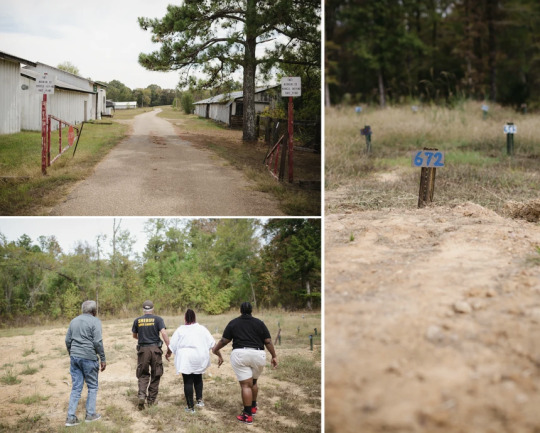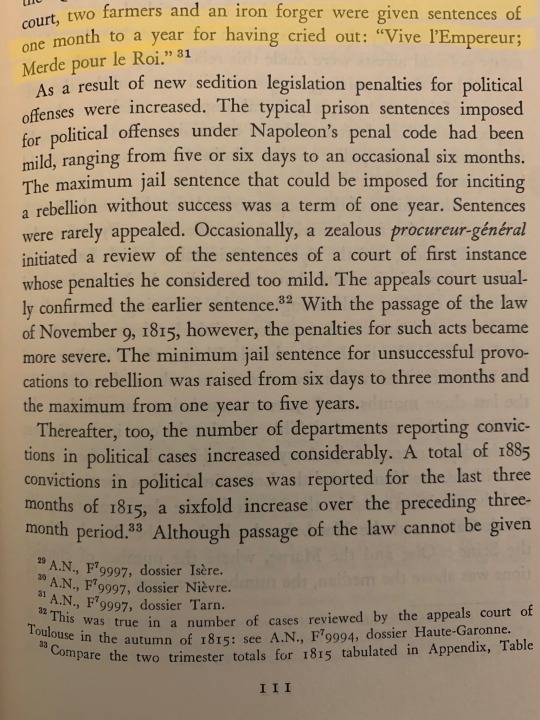#penal reformers
Text
"Thus, the declared purpose of modern prison reform, one gathers, is: To make the prison an institution which will reform the criminal.
As I sat in my cell, year after year, reading the articles, books and speeches in which the penologists were enunciating this doctrine, I waited eagerly for some sign of change in the actual administration of the prison. But nothing happened. I waited in vain.
For I am obliged to record the fact that, during the years I spent in the state prisons of New York and Massachusetts, not a single attempt was ever made to reform me, and that I did not see a single attempt officially to reform criminals as an aim of prison administrative policy.
I remember, in this connection, talking one day with the late Thomas Mott Osborne about the prison-reform movement. He said, among other things: "It is so discouraging. People flock to the meetings; they are remarkably sound in their responses; the shocked, moved, indignant at the right moments; they applaud vigorously; they come up to the rostrum after the meeting and offer their money and services; and then they go to their homes and forget all about it. They simply will not do anything."
For a time I was inclined to accept this explanation; that people in the outside world are simply indifferent about prison conditions. But lately I have been persuaded that it is not mere indifference, but actual satisfaction with existing conditions, which is responsible for society's delay in changing the prison "from a human scrap-heap into a human repair-shop." It must be, I have decided, that the majority of people still believe in the ancient doctrine of "an eye for an eye, and a tooth for a tooth," and regard the prison as the place where the criminal shall expiate his sins.
If, therefore, the real (as it is the declared) object of imprisonment is the reformation of the convict, then, as matters stand at present, the American prison is a most abject failure as a social institution.
It is banal to state that in order to fulfill the reformation purpose the prison environment must be greatly altered. Yet, whenever any attempt is made to do so, there instantly arises a loud and persistent chorus of criticism, mainly from the daily press. The cry of pampered criminals, "men's clubs" arises and feeds the average law-abiding citizen's hatred of the criminal.
This is not to say that the criminal should be pampered and petted, or that the prison should be made a cross between a night club and a health resort. Neither is it to say that the prison should remain a steel-barred stone coffin, as it continues to be in most states. It is simply to say that before the prison can achieve its object many substantial changes must be made; and that it will be well for the arm-chair critics, who create such a disturbance at each attempt to make such changes, to realize that their prejudiced criticisms are of great harm, in the end, to that society of which they themselves are a part. For not until these changes are made will the prison be able to transform the criminal into the citizen."
- Victor F. Nelson, Prison Days and Nights. Second edition. With an introduction by Abraham Myerson, M.D. Garden City: Garden City Publishing Co., 1936. p. 42-45
#words from the inside#prisoner autobiography#penal reform#penal reformers#middle class ideology#american prison system#law and order politics#prison days and nights#victor nelson#history of crime and punishment#rehabilitation#political corruption#reading 2024#failure of rehabilitation#thomas mott osborne#purpose of incarceration
7 notes
·
View notes
Text
Torture during the Napoleonic era
Torture was abolished in France in 1808 in the Code d'Instruction criminelle (Clémence Zacharie). Napoleon had earlier said on the issue of torture:
“The barbarous custom of having men beaten who are suspected of having important secrets to reveal must be abolished. It has always been recognized that this way of interrogating men, by putting them to torture, produces nothing worthwhile. The poor wretches say anything that comes into their mind and what they think the interrogator wishes to hear.”
Napoleon to Berthier, 11 November 1798, Corres., V, no. 3606, p. 128
#Napoleon#Berthier#Clémence Zacharie#napoleon bonaparte#Code d'Instruction criminelle#penal code#napoleonic code#napoleonic era#napoleonic#first french empire#french empire#19th century#1800s#laws#torture#napoleonic laws#history#Napoleon on the Art of War#Napoleon on the Art of War (2001)#Jay Luvaas#civil law#napoleonic reforms#Napoleon’s reforms#reforms
40 notes
·
View notes
Text
When The Bail And Parole Systems Are A Farce Then Crime Will Flourish
What we need in Canada is more severe penalties for violent crime and drug dealing.
We definitely need automatic life sentences for selling meth, crack or Fentanyl.
Opiate dealers are serial killers. They methodically plot the identical deaths of each and every person they sell to. Like an evil butterfly effect, eventually death comes from each sale.
That said, wouldn’t it be appropriate to…
View On WordPress
0 notes
Text
Landmark Legislation: Parliament Passes Historic Criminal Law Bills for Overhauling Justice System
Landmark Legislation: Parliament Passes Historic Criminal Law Bills for Overhauling Justice System #CriminalLawReform #ParliamentLegislation #JusticeSystemOverhaul #LegalNews #BharatiyaNyayaSanhita #BharatiyaNagarikSurakshaSanhita #BharatiyaSakshyaSanhita
The Rajya Sabha passed three criminal law bills on Thursday, December 21, 2023, after the Lok Sabha had passed them on Wednesday. The bills are:
Bharatiya Nyaya (Second) Sanhita, which replaces the Indian Penal Code, 1860.
Bharatiya Nagarik Suraksha (Second) Sanhita, which replaces the Code of Criminal Procedure, 1898.
Bharatiya Sakshya (Second) Sanhita, which replaces the Indian Evidence Act,…

View On WordPress
#Bharatiya Nagarik Suraksha Sanhita#Bharatiya Nyaya Sanhita#Bharatiya Sakshya Sanhita#Code of Criminal Procedure#Constitutional Amendments#Criminal Law#Indian Evidence Act#Indian Penal Code#Justice Reform#Legislative Process#Parliament#Sedition#Terrorism
0 notes
Text
India's Legal Labyrinth: A Satirical Guide to Understanding BNS2, BNSS2, and BSB2
**Once Upon a Time in a Legal Wonderland:**In the grand democratic theatre of India, where laws are often more dramatic than Bollywood blockbusters, we’re witnessing the introduction of three legal musketeers: Bharatiya Nyaya (Second) Sanhita (BNS2), Bharatiya Nagrik Suraksha (Second) Sanhita (BNSS2), and Bharatiya Sakshya (Second) Bill (BSB2). They’re set to replace old legal classics – the IPC,…
View On WordPress
#2023#BNS2#BNSS2#BSB2#civil liberties#civil rights#Code of Criminal Procedure#constitutional law#democratic debate#freedom of speech#India legal reforms#Indian Evidence Act#Indian Parliament#Indian Penal Code#judicial system#Khalistan-movement#legal controversies#legal satire#legal updates 2023#Legal-Analysis#legislative process#National-Security#political humor#sedition law#treason in India#witty commentary
0 notes
Text
The Best News of Last Year
1. Belgium approves four-day week and gives employees the right to ignore their bosses after work

Workers in Belgium will soon be able to choose a four-day week under a series of labour market reforms announced on Tuesday.
The reform package agreed by the country's multi-party coalition government will also give workers the right to turn off work devices and ignore work-related messages after hours without fear of reprisal.
"We have experienced two difficult years. With this agreement, we set a beacon for an economy that is more innovative, sustainable and digital. The aim is to be able to make people and businesses stronger," Belgian prime minister Alexander de Croo told a press conference announcing the reform package.
2. Spain makes it a crime for pro-lifers to harass people outside abortion clinics

Spain has criminalized the harassment or intimidation of women going for an abortion under new legislation approved on Wednesday by the Senate. The move, which involved changes to the penal code, means anti-abortion activists who try to convince women not to terminate their pregnancies could face up to a year behind bars.
3. House passes bill to federally decriminalize marijuana

The House has voted with a slim bipartisan majority to federally decriminalize marijuana. The vote was 220 to 204.
The bill, sponsored by Democratic Rep. Jerry Nadler of New York, will prevent federal agencies from denying federal workers security clearances for cannabis use, and will allow the Veterans’ Administration to recommend medical marijuana to veterans living with posttraumatic stress disorder.
The bill also expunges the record of people convicted of non-violent cannabis offenses, which House Majority Leader Steny Hoyer said, “can haunt people of color and impact the trajectory of their lives and career indefinitely.”
4. France makes birth control free for all women under 25

The scheme, which could benefit three million women, covers the pill, IUDs, contraceptive patches and other methods composed of steroid hormones.
Contraception for minors was already free in France. Several European countries, including Belgium, Germany, the Netherlands and Norway, make contraception free for teens.
5. The 1st fully hydrogen-powered passenger train service is now running in Germany. The only emissions are steam & condensed water.

Five of the trains started running in August. Another nine will be added in the coming months to replace 15 diesel trains on the regional route. Alstom says the Coradia iLint has a range of 1,000 kilometers, meaning that it can run all day on the line using a single tank of hydrogen. A hydrogen filling station has been set up on the route between Cuxhaven, Bremerhaven, Bremervörde and Buxtehude.
6. Princeton will cover all tuition costs for most families making under $100,000 a year, after getting rid of student loans

In September, the New Jersey Ivy League school announced it would be expanding its financial aid program to offer free tuition, including room and board, for most families whose annual income is under $100,000 a year. Previously, the same benefit was offered to families making under $65,000 a year. This new income limit will take effect for all undergraduates starting in the fall of 2023.
Princeton was also the first school in the US to eliminate student loans from its financial aid packages.
7. Humpback whales no longer listed as endangered after major recovery

Humpback whales will be removed from Australia's threatened-species list, after the government's independent scientific panel on threatened species deemed the mammals had made a major recovery. Humpback whales will no longer be considered an endangered or vulnerable species.
Climate change and fishing still pose threats to their long-term health.
Some other uplifting news from last year:
A Cancer Trial’s Unexpected Result: Remission in Every Patient
California 100 percent powered by renewables for first time
Israel formally bans LGBTQ conversion therapy
Tokyo Passes Law to Recognize Same-Sex Partnerships
First 100,000 KG Removed From the Great Pacific Garbage Patch
As we ring in the New Year let’s remember to focus on the good news. May this be a year of even more kindness and generosity. Wishing everyone a happy and healthy 2023!
Thank you for following and supporting this g this newsletter
Buy me a coffee ❤️
1K notes
·
View notes
Text

Like many people in Britain, you probably watched with horror the US supreme court’s reversal of Roe v Wade, thinking, “Thank goodness women could never be prosecuted for having an abortion here.”
But let me tell you, it already happens here.
Two women are currently awaiting criminal trial in England for abortion-related offences, both facing charges that carry a maximum sentence of life. At least 17 women have been investigated by police over the past eight years for having had abortions.
In Oxford, a 25-year-old mother of one is facing trial for allegedly taking the drug misoprostol – one of the two pills routinely prescribed by doctors to abort a pregnancy. But her baby was born alive and she was subsequently reported to the police. She is being charged under the Offences Against the Person Act, a law passed by parliament in 1861, before the invention of the lightbulb and before women had the right to vote. The law states that a woman must be “kept in penal servitude for life” if she procures an abortion.
Another woman is facing trial after she took abortion pills she obtained from the British Pregnancy Advisory Service (BPAS) by post when rules were relaxed during the pandemic to allow this. She was allegedly 28 weeks pregnant at the time and is facing charges of “child destruction” (note the visceral language) under the Infant Life (Preservation) Act from 1929, which also comes with a maximum life sentence. She could spend the rest of her life in prison.
We so often think that the 1967 Abortion Act legalised abortion. But it did no such thing. It partially decriminalised abortion in England, Scotland and Wales, so long as strict conditions were in place, such as a confirmation from two medical practitioners that the pregnancy had not exceeded 28 weeks (subsequently reduced to 24 weeks in 1990), or that the termination was necessary to prevent injury or mental harm. Any abortion outside these criteria is still a criminal offence.
We know that it is overwhelmingly vulnerable women who are investigated and prosecuted for having abortions. One woman collapsed in the dock when she was sentenced to two and a half years in 2015 for taking tablets she had bought online to induce a miscarriage after the 24-week period of gestation. The court heard that she had “a history of emotional and psychological problems”.
Another woman, a mother of one, ordered pills online to induce an abortion in 2019 after her abusive boyfriend had told her not to go to the doctor. She had believed she was eight to 10 weeks pregnant but after a traumatic miscarriage in her bath tub, where she has described sitting in an inch of blood, she realised her pregnancy had been much further along. She was arrested in her hospital bed and served two years in prison.
These are just some examples of women who have faced trial: there are multiple other women who face gruelling police investigations. In 2021, a 15-year-old girl was investigated for a year after suffering an unexplained stillbirth. Her phone and laptop were confiscated during her GCSE exams, she was self-harming, and the investigation only ended after a coroner concluded that the pregnancy ended due to natural causes. Another woman was arrested in hospital last year and kept in a prison cell for 36 hours after a stillbirth at 24 weeks, and is now suffering PTSD. My question is this: if a woman has had an abortion late in the gestation period, or a traumatic miscarriage or stillbirth, should she go to prison or should she be offered support from medical practitioners at what is clearly a horrendous time, both mentally and physically?
Women in 2022 are being shackled by a 160-year-old law made at a time when we were not even allowed to set foot in the House of Commons. Urgent reform is needed to protect more women from harm, which is why organisations such as BPAS and the Royal College of Obstetricians and Gynaecologists (RCOG) are calling on the director of public prosecutions for England and Wales, Max Hill QC, to drop all charges against these women. The RCOG this month has gone further, calling on ministers to finally legalise abortion. There is absolutely no public interest in sending vulnerable women to prison for terminating pregnancies. Instead, these prosecutions will only serve to put off women seeking help from doctors because they might get arrested, pushing more women into unsafe and underground options.
Meanwhile, according to the criteria of the Abortion Act, a woman has to show that she would suffer grave permanent injury to her mental health if she did not have an abortion after 24 weeks. Why should women still have to pathologise themselves as mad, hysterical, unfit or suffering to legally access healthcare?
The state currently has a triple lock on women’s bodies. By not legalising abortion it has the right to force pregnancy, birth and motherhood upon us. Look to the rules on organ donation: it is illegal to donate people’s organs after they die (however desperately they are needed by people on waiting lists) without their permission. The law at present, which denies women the right to abort a pregnancy on their own terms, is to give us less autonomy than a corpse.
Link | Archived Link
1K notes
·
View notes
Text
it's been a while since i've done a particularly egregious ACAB post, so i guess it's about time. trigger warning for racist violence, death and police brutality.
on March 14th, 2023, in Hinds County, Mississippi - the most populous county in the State of Mississippi, an area i used to dispatch tow trucks to for a roadside emergency service company and know well - Bettersten Wade reported Dexter Wade, her 37-year-old son missing.
what Dexter's mother did not know at the time and would not know until an unacceptable and heart wrenching 172 days later is that 9 days prior, on March 5th, 2023, Dexter had been killed less than an hour after he’d left home, struck by a Jackson, Mississippi police vehicle as he attempted to cross a nearby interstate highway.
police knew Dexter's name, and Bettersten's, but did not contact her and the body went unclaimed for months in the county morgue.
the following October, she was directed to the Hinds County penal farm to meet a Sherriff's Deputy, who lead them into fucking woods, where her son was buried in a grave simply marked with the number "672"

now, after the police neglectfully took this man's life, failed to inform his family, and attempted to cover it up... it turns out that his wallet with his home address, a credit card and a health insurance card was in the front pocket of his jeans at the time of his death.
this is after the Hinds County coroner's office reported that they did not find identification on Dexter Wade's body, but found his name on a bottle of prescription pills that they used to ID him several days later. undoubtedly, this was to provide police ample time to cover up their tracks.
the Mayor of Jackon, MS, Chokwe Antar Lumumba (a self-described Progressive, Socialist and "political revolutionary") said last month that Wade was "without ID" and that police were unable to identify him.
this is about to get, somehow, more fucked up.
in addition to the disrespect shown already to Dexter Wade, his family and his memory, officials from the State of Mississippi exhumed his body on Monday without his family in attendance.
On Monday, authorities exhumed Wade's body following calls for an independent autopsy and funeral. But his family said officials failed to honor the agreed-upon time approved by a county attorney for exhuming the body.
“Now, I ask, can I exhume my child and try to get some peace and try to get a state of mind,” Bettersten said. “Now y’all take that from me. I couldn’t even see him come out of the ground.”
Civil rights and personal injury attorney Ben Crump told USA TODAY Wade's mother was notified last week by the attorney for the Hinds County Board the exhumation would be at 11:30 a.m. Monday. The family, along with their attorneys, members of the media and community advocates had planned to attend, but Crump said Wade’s body was exhumed at 8 a.m., hours before the scheduled time and without notice.
“There is no excuse for the way this case has been handled. Every time Ms. Wade takes a step toward getting answers as to what happened to her son, Jackson officials bring her two steps back,” Crump said.
this is a heavy post. but as usual, the point here is: the institutions we currently in place throughout this country are corrupt, soulless and have no respect for you in life or death. the state and the police are corrupt and will kill you - intentionally or unintentionally - and then bury the evidence as deep as they possibly can. and the slime will insulate them from within. it's unacceptable. it cannot be reformed.
#us news#mississippi#dexter wade#black lives matter#civil rights#bork bork thoughts#united states#tw racism#tw police#tw death#acab#ftp#1312#all cops are bastards#fuck the police
84 notes
·
View notes
Text

Finally made a reference sheet for the Dim Sun members in my Pokemon Ranger Shadows of Almia Resocialization AU!
The story resumes 4 years after Operation Brighton was successfully completed. Hastings and Erma learn that the higher ranked Ex Team Dim Sun members are supposed to be released into early probabtion time. When they visit the former criminals they realize that while they have recovered from the effects of the Dark Crystal and don't seem to pose a big threat to Almia anymore they aren't quite decent people and useful members of society yet.
So with all of her chivalry Erma decides to get the Union involved in their probabtion time. Together with Hastings she comes up with a program that seeks to reform and resocialize the former villains.
Here's a short preview of the resocialization program document:
Every Ex-Dim-Sun-Member will be assigned a partner and mentor figure from the Union who holds authority over them but also takes responsibility for their actions during probation.
2. Every Ex-Dim-Sun-Member will receive a weekly schedule filled with tasks similar to community service.
3. Every Ex-Dim-Sun-Member has to support their mentor and must contribute to their job in a positive way
4. Criminal activities and prohibited behaviors of the attendants of this program will be penalized with the program and probation time being revoked.
...
The mentorship relations
Wyatt (Blake) Hall - Rhythmi
Kincaid - Kate
Wheeler - Wendy
Ice - Murph
Lavana - Keith
Heath - Sven
Wyatt: A bit self-conscious and still haunted by his past crimes and immense feelings of guilt. But overall he is a pretty facile person and Rhythmi does not have any trouble with him. He is a flagship attendant of the program. Wyatt completes his tasks with honesty and nothing but good intentions for the people of Almia and his mentor. Sometimes he is a bit depressed but learning to be valuable to society and a good person improves his mental state more and more. Wyatt is not sure what he wants to do with his life yet but he feels inspired to help people and Pokemon as much as he can to try and make up for his past mistakes.
Kincaid: While he understands that he had to face prison for the list of crimes he commited he is not happy with the program being forced onto him. He was an independent man before Team Dim Sun and he can find a way to live an honest life by himself. Kincaid still believes that he doesn't need to have faith in other people to achieve his goals, no matter their moral alignment. Kate acting as some sort of mentor is ridiculous to him, what could he learn from a young adult anyway? Kate and Kincaid's partnership is held back by their opposite world views and distrust. They get into arguments a lot to the point it's hindering the program. Hastings decides to cuff them together so they have to learn to work as a team. Kincaid's additionally helping Hastings with strategizing for missions and Kate has to attend every meeting of them being nerds, obviously.
Wheeler: Wendy and Wheeler get along as soon as they realize how much they can learn from each other. She expects him to have his own opinion and view of things and helps him to grow as a person. His biggest weakness was the dependency on his former boss and his approval. Once Wendy learns about his talent for cooking they spend a lot of time doing that together. (Much to the other Union members' delight.) Wheeler tries to be a friendly fella but has his snarky moments anyway. He especially loves annoying Ice and Kincaid as they both seem to be not improving much as people.
Ice: The usually cool ex boss of the Sinis Trio seems to have fallen into some sort of rebellious phase. Murph is trying his best to have Ice do the tasks he is assigned and still be a diligent Union member. But all of his attempts only motivate Ice to be more problematic. If Murph didn't know any better he would say Ice wants to go back to prison because that's easier than trying to improve. It's the path of least resistance and doesn't require Ice to work hard. With some time and lots of stupid pranks he begins to feel guilty for causing Murph so much trouble. Ultimately he is impressed by Murph not giving up on him despite his behavior and really tries to change for the better.
Lavana: Out of all the ex members Lavana for sure is the most ambitious attendant. Shortly after the program starts she announces that she wants to pick up her dream of becoming a Pokemon Ranger again. Despite some protests from Hastings she receives the position as a trainee Ranger at the Union from Erma. She is still a little princess at the start but Keith and her new job help her realize that some things in life are only attainable through hard work and passion. The people and Pokemon of Almia showing gratitude is something new but Lavana feels very accomplished every time she helped someone. However, she gets gradually annoyed with Keith being absent so often, mentally and physically. Somehow he is obsessed with making sure Kate is alright.
Heath: Sven has no trouble with Heath, he may be a slow learner but he is also very patient and obedient. Heath seems to be glad that the Union is taking care of him and sees the program as his 2nd chance in life. It appears that he is more worried about how some of his former colleagues don't take this seriously. Sven does not feel any deeper attachment towards Heath, unlike some of his Ranger colleagues. For him this is just a job that needs to be done. Heath looks up to Sven and admires his confidence and sense of morality. He becomes increasingly helpful on missions and proves to be a gentle giant when it comes to caring about his friends and former colleagues. To him Dim Sun was his family.
Thanks for reading my little introduction post.
70 notes
·
View notes
Text
It's Makuta o'clock
A rather extravagant Makuta who specialized in vibrantly colorful and fanciful bird rahi. The Makuta's evolution to gaseous beings presented a new problem regarding the need for new bodies, and this Makuta saw his opportunity and went for it, becoming the expert in body design; aiding his fellow Makuta in either tailoring their own new vessels to better suit their needs or creating entirely new bespoke ones for them. He himself could never settle for just one body, and frequently hopped between countless vessels of his own design, many of them just as colorful and fanciful as his rahi. He was harvested for his Antidermis by Teridax upon the latter's ascension to the new GSR.
A Makuta who was rather paranoid about their own survival, and considering how the Brotherhood was, this fear wasn't exactly baseless. Their obsession with keeping watch on everyone eventually gave them the position of security chief of the Brotherhood. They mainly stayed in the Makuta's headquarters as the fortresses' panopticon, having created a species of fluttering eyeball-like rahi that were all psychically connected to each other and their creator, forming a sort of security camera system so this Makuta could observe the going ons of the fortress. Their paranoia and position ultimately did not save them from the fate of many Makuta, being cannibalized so their Antidermis could fuel Teridax's Rahkshi legions. There are multiple groups on the newly reformed Spherus Magna who are looking to try and use the surviving eyeball rahi for their own security and spying purposes, but results have been lackluster.
A Makuta who truly loved making bizarre, usually dangerous, and often highly venomous rahi species. The Fusa was one of their tamer creations, and one of the few to spread out in the matoran universe, but most of their work was confined to the largish island in the south of the MU they were assigned. The island was used as a penal colony by the league of six kingdoms in the past, but the island is nowadays more known for its hardy inhabitants and wildly unique and deadly rahi. This Makuta has not been seen for quite some time, with the Brotherhood's internal register listing them as "presumed dead". Despite this, nobody is quite sure as to how they died, or even if they did, although a common joke answer is that they finally created a rahi so deadly that it killed them.
20 notes
·
View notes
Text
And the penal colony was to remain a viable alternative to the penitentiary, not only in nineteenth-century Britain, but also in twentieth-century France [...]. But what might it mean to have a rigorous and distant form of imprisonment, located in a colony and continuing until the mid–twentieth century? [...]
---
French Guiana emerged as an early favorite for the placement of a French penal colony. [...] Daniel Lescallier, [...] authored a work entitled [...] (Exposition of the means by which to develop French Guiana). In it he points to the example the British have set in exporting offenders to the colonies [...]. Louis-Napoleon, still serving in the capacity of president of the republic, threw his weight behind [...] the exile of criminals as well as political dissidents. “It seems possible to me,” he declared near the end of 1850, “to render the punishment of hard labor more efficient, more moralizing, less expensive [...], by using it to advance French colonization.” [...] The era of the French penal colony was now open; the new French Empire had begun its Botany Bay, even as the British original [penal colony in Australia] wound to a close. [...] The double logic of the British system also drives the French imagination; proposals alternatively concentrate on a desire to punish criminals and rid the Metropole of their presence, on the one hand, and a hope of furthering the work of colonial expansion and economic progress, on the other. Within this logic the focus shifts between the need to colonize, the need to punish [...].
In the case of France, it shimmers with colonial fantasy, allowing future Australias to emerge on tropical horizons. [...] [T]he penal colony requires location. The specificity of the site matters; it is the very place that is to enact punishment [...]. The penal colony is in essence a geographic technique [...]. But despite frequent outcries and sensational reports, the French Guiana penal establishment continued to exist through the end of World War II. [...] As geography itself becomes a technique of isolation, the French penal experiment in Guiana threatens further ordeals implicit in separation from all that is civilized. [...] In sensational accounts these tropics incessantly punish [...]: “Fever and dysentery get every man! Clouds of buzzing mosquitoes and fire ants sting your aching body while you labor [...].” As the commandant of the bagne would inform convicts on their arrival, “The real guards here are the jungle and the sea.” [...] Many of the prisoners, after all, were from urban environments [...]. The terror of Devil's Island takes shape amid metaphoric invocations of the jungle and of the savage [...].
---
For those in Metropolitan France the penal colony served as a hidden punishment, a distant if graphic terror, retaining elements of torture out of public view. Yet it retained a veneer of reformation, for the convicts were still told to “make a new life for themselves.” In addition, shipping convicts away from France in the name of colonization cloaked their punishment in the robes of the “civilizing” mission: they would be part of an effort to build a greater France, to develop Guiana, and to integrate it into a Franco-world system. At the same time the bagne underscored that resistance to the humane norms of France could lead to decivilization and exile in the wilderness. [...]
---
For those sent to French Guiana, however, the penal colony served directly as a public display, a constant reminder of the operations of justice. The convicts were not merely confined but forced to labor on public works. Official executions were performed by that once-humane instrument, the guillotine, but before an audience of convicts and by a fellow convict, far beyond the gates of Paris. A slower execution, that of the “dry guillotine,” the effects of the tropical climate, surrounded the entire process of deportation, reminding the convicts that this punishment could only happen here and not within Metropolitan boundaries. Theirs was a raw and primitive environment, one of torture and deprivation away from the public eye. Against the truth invoked in their conviction -- justice -- lay a suggested truth invoked in their punishment: no longer civilized, they were no longer human.
---
And for those already living in French Guiana, the penal colony also served as a public spectacle, if one not aimed directly at them or of their making. Not only did the proximity of prison life to their own lives parade the power of justice before them in an immediate fashion, but the constant importation of prisoners for this apparatus of punishment emphasized the particularly colonial nature of this power. Uncivilized elements were sent to them; their relation to France was that of a repository for human waste, and acts and punishments deemed unseemly for the homeland could still occur within their boundaries.
In addition, the appropriation of the names “Guyane” and “Cayenne” in myths of the bagne and “Devil's Island” precluded other identities, while burdening the area with a symbolic brand and a historical chain to France. “The bagne,” writes Ian Hammel, “left only a disastrous brand on Guiana.”
Brand here means “trademark” as well as “scar,” indicating purpose, function, and maker.
To be remembered as a penal colony is to be remembered not only as a prison, an exotic place of horror, but also as a colony, the object and product of another. [...] Modernizing France, a convulsive patchwork of provinces, cities, farms, and factories, casts its shadow overseas. [...] The penal colony takes shape at a crucial moment in European colonial understandings of place and labor. Slavery had just been abolished in the French Empire […]. If slavery were at an end, then the crucial question facing the colony was that of finding an alternative source of labor [...], not only in French Guiana, but also throughout colonies built on the plantation model.
---
All text above by: Peter Redfield. Space in the Tropics: From Convicts to Rockets in French Guiana. 2000. [Bold emphasis and some paragraph breaks/contractions added by me. Presented here for commentary, teaching, criticism purposes.]
91 notes
·
View notes
Text
Progressive-Era Prisons and the Emergence of Prison Sexual Culture
"Fag Follies" and football games would seem to be worlds away from the dens of solitude and enforced silence held as carceral ideals just a few decades before. Changes in prison administration and prison architecture and penology aimed at enhancing inmate sociability in the 1910s and 1920s combined to create new sexual possibilities among prisoners. Material changes in prison architecture and administration that made possible new forms of contact between inmates made sexual contact more likely well, creating new sexual geographies behind bars. Prison writers probably devoted more attention to prison sex in the early twentieth century, at least in part, because there was more sex in prison to attend to.
Beginning in the 1910s, Progressive reformers undertook an ambitious agenda to transform the prison. While few prisons if any had achieved the utopian nineteenth-century goal of perfect carceral solitude, a new generation of prison reformers and administrators judged those earlier visions once inhumane and impractical. Armed with progressive ideas about trinality that emphasized environmental and psychological causes over congenital and moral ones, reformers repudiated nineteenth-century strategies of solitary penitential reflection as well as the disciplinary practices of lockstep marching, the rule of silence, the humiliation of striped uniforms, and corporal punishments such as flogging and the water torture, and the shackling of inmates to cell walls still practiced in many prisons. Embracing a new commitment to correction and rehabilitation, they encouraged inmate sociability, collective labor, exercise, and recreation that, they hoped, might approximate the normal society to which the reformed criminal would return.
The federal penitentiary in Lewisburg, Pennsylvania, opened in 1932, was built with six dormitories rather than cells, with the notion that "the openness promotes rehabilitation by teaching men how to get along with each other. " Some prisons built baseball diamonds and exercise yards and organized football leagues and prison bands, and prisoners in many institutions began to enjoy weekly movie nights. Some reform-minded prison administrators went so far as to give prisoners a role in the government of their own community. A pioneer in the concept of inmate self-government, reformer and warden Thomas Mott Osborne established the Mutual Welfare League in the New York state prisons at Auburn and Sing Sing. Designed to train prisoners in the exercise of democracy, the league was composed of a committee of prisoners elected by their peers and responsible for overseeing prison disciplinary procedures.
Changes in prison architecture and its uses, reflected most centrally in the yard, accompanied and reinforced new ideas about prison life. An iconic feature of the "Big Houses" of the day - Sing Sing, San Quentin, Stateville, and Jackson foremost among them - "the yard" referred typically to an open expanse in the middle of the prison. Often surrounded by imposing and fortified walls and towers, its barbed-wire (and later electrified) borders were closely patrolled by armed guards. The activities within, however, were often considerably less strictly monitored than its perimeters. As "freedom of the yard" was gradually extended, prisoners spent less time by themselves in their cells and more time mingling with each other.
The resulting prison sociability ran directly counter to the Benthamite vision of strict surveillance and perfect discipline, and was captured in the writing of many prisoners. On admission to Utah's state penitentiary, Jack Black explained that he was "turned loose in the yard where there were about one hundred prisoners." There, the prisoners played poker all day in the yard on blankets, and occasionally a game bull, when they could get up enough ambition." Inmate George Wright described the federal penitentiary at Leavenworth in 1915 as "a Jory": "All the prisoners are allowed to roam anywhere inside the walls, you can say run foot races, or anything you like." Edward Bunker told of living "two lives" as an inmate at San Quentin a few decades later in the early 1950s, "one in the cell from 4:30 p.m. to 8:00 am.. the other in the Big Yard." "In those days," Bunker explained, "convicts had the run of the inside of the prison. Each morning when the cell gate opened, I sallied forth to find adventure."
The yard was a place of exercise, organized athletics, and casual congregation. Reformers and administrators hoped that these changes would promote a healthier, more "natural" environment that would help prepare prisoners for life after release. But inmates in early-twentieth-century prisons took advantage of the new blind spots in prison surveillance to engage in a range of illicit as well as licit activities, including drug dealing and consuming, fighting, and sex. "Every day at nine o'clock the cells were opened by the turnkeys, and the men circulated freely in the entire prison block for the rest of the day," African American Communist organizer Angelo Herndon recalled in his 1937 autobiography. "This made it possible for the prisoners with homosexual inclinations to go prowling around for their private pleasures." Prisoner Malcolm Braly recalled a time, before the segregation of homosexuals at San Quentin initiated at the beginning of warden Clinton Duffy's regime in 1941, when "the queens had been free to swish around the yard and carry on open love affairs." The "corner of the yard" was the site of a wedding ceremony between male inmates observed by Piri Thomas, as well as for the wedding ceremonies of inmates of the women's penitentiary at Bedford Hills years later.
The new uses of the yard opened up a place of sexual display and opportunity in many prisons. But a loosely supervised yard could also be a place of sexual vulnerability and danger. "Vast and forbidding when empty," the yard, in prison chaplain Julius Leibert's description, was "a monster when packed. Five thousand heads, ... and a million pent-up hungers aching to burst forth-that's the yard. Perverts on the prowl, jockers' ganging up on a fish, 'queens' reveling in fights between rivals for their favors, homos pairing off for an affair or quarreling like obscene lovers."
The early twentieth century also witnessed the expansion of profit-making prison industries, bringing together prisoners to work in laundries, woodshops, metal shops, forges, mines, quarries, and farms. Collective workshops were much less closely monitored than cellblocks, and the movement of prisoners there, as on the yard, was less carefully regulated. These changes also produced new opportunities, settings, and spaces for encounters between prisoners, some of them sexual. Inmate John Reynolds had earlier warned of the "horrible and revolting practices of the mines" where prisoners labored together side by side in the federal prison at Leavenworth, Kansas. There, "far removed from light and even from the influences of their officers," prisoners were free to "mistreat themselves and sometimes the younger ones that are associated with them in the work." Years later, Ted Ditsworth described his first day working to coal mine as a prisoner in Missouri in the 1920s:
"I had many propositions where these miners would dig my task for me if I would be their kid - was they meant was that they wanted to use me in a homosexual way."
Some of this new inmate sociability and relative freedom from scrutiny was the result of progressive planning, and some was an inevitable consequence of the overcrowding of prisons that had vexed nineteenth-century prison administrators and intensified in the twentieth century. The prison population in the United States more than doubled between 1890 and 1925 and grew even more rapidly from 1920 until World War II, swelling with the rise in unemployment during the Depression. Despite a new commitment to identifying and classifying homosexual, mentally ill, and "hardened" prisoners in order to segregate them from the general population, not all prisons could afford to employ trained psychiatrists or had the physical space to put those plans fully in place.
Overcrowded prisons carried associations of sexual impropriety for early-twentieth-century observers, as they had for their predecessors a century earlier. Louis Berg cited overcrowding as a serious factor contributing to prison homosexuality, writing that "when two or more men are confined in one cell and sex starvation has existed for some time, "doubling up' becomes more than a mere expression to denote cell occupancy. One prisoner described life in the military disciplinary barracks in 1919 as a place where "a man of refined sensibilities is often quartered in the same double-decked bunk with a degenerate or a moral pervert." Investigator Dean Harno wrote to sociologist Ernest W. Burgess in 1927 about the reformatory at Pontiac, Michigan: "All cells have two inmates and quite a number have three. This brings a very acute matter in connection with the morals of the institution." A prisoner of that institution called Pontiac "a 'deformatory'" in 1927, noting of sexual perverts: "They take them fellows and separate them in a separate building so they don't have to mix with the other fellows." Unevenly instituted in prison for men, the practice of segregating homosexuals was virtually unheard of most institutions for women. Kahn noted that, at the Women's Workhouse on Welfare Island, "the homosexuals have been unclassified and are not segregated so that they all mingle freely with the other and are not segregated. "
Prisons varied dramatically by geographical region, and certainly not all prisons put progressive reforms into practice. Many Western state penitentiaries in the early decades of the twentieth century, some resembling hastily built stockades, allowed for little if any classification and segregation of prisoners by offense, sexual disposition, or any other taxonomy. Prisons were peripheral to the criminal justice system that emerged in the South after the Civil War, and some Southern states lacked them altogether. Instead, convict-lease systems flourished in the post-bellum South, drawing heavily on a newly criminalized population of black men and essentially replacing the labor system of slavery. Prisoners in that system were contracted out by the state to work on sugar and cotton plantations, in coal and phosphate mines, turpentine farms, brickyards, quarries, and sawmills, and on levee and railroad construction, where they were exposed to harsh conditions and often brutal treatment. Later in the 1930s, prisoners in the South worked on chain gangs, moving about in labor camps rather than housed in permanent prisons. Mississippi's notorious Parchman penal farm, with its sprawling cotton acreage, predominantly African American field hands, and armed white overseers, resembled an antebellum plantation more closely than it did a modern prison. Constructed in 1904, Parchman served the postbellum imperatives of racial subordination and control and provided as well a cheap and steady labor supply for the rapidly industrializing New South.
Even those prisons furthest removed from Progressive ideals, however, allowed for considerable interaction among prisoners. Convicts leased by railroad companies "slept side by side, shackled together" in mobile iron cells. Collective work and living conditions on prison plantations, in which men worked together by day and slept together in stacked bunks in barracks known as "cages" by night, also allowed for considerable unsupervised contact among inmates, albeit under horrific conditions.
With this increase in inmate interaction and sociability emerged a distinctive and broad-based prison culture that expanded and flourished in the early twentieth century. Prison accounts in this period recognized the development of a prisoners' code of behavior and ethics, the establishment of a tradition of prison tattooing, prison songs and work chants, and the emergence of a comprehensive prison argot. Prison sexual culture was part of this efflorescence of inmate cultural life and increasingly expansive communal life among prisoners.
- Regina Kunzel, Criminal Intimacy: Prison and the Uneven History of Modern American Sexuality. Chicago: University of Chicago Press, 2008. p. 73-75
#penal reform#penal reformers#wolves and punks#history of homosexuality#history of heteronormativity#sex in prison#life inside#academic quote#reading 2021#progressive penology#prison administration#classification and segregation#history of crime and punishment#american prison system#penology#queer history
6 notes
·
View notes
Text

The White Terror and Political Reaction after Waterloo. By Daniel P. Resnick
#restoration#bourbon restoration#coalitions#napoleonic#penal code#napoleonic era#Napoleon#France#first french empire#Napoleonic code#the white terror#The White Terror and Political Reaction after Waterloo. By Daniel P. Resnick#napoleonic reforms#Napoleon’s reforms
10 notes
·
View notes
Text
From the article:
Florida school principals could face state penalties if they are determined to have illegally prevented students from looking at library books in their schools, under a new rule under consideration by the state Department of Education.
Randy Kosec, chief of the department’s Office of Professional Practices, introduced the proposed rule on Friday during a lightly attended 20-minute online workshop. It reads that “a school principal shall not prevent, direct anyone to prevent, or allow anyone to prevent students from accessing educational materials without legal cause to do so.”
The activity came two weeks after Gov. Ron DeSantis called for reforms to the book challenge process, which he said had been abused by “bad actors.”
Florida has received national attention for a surge in the number of books that schools have pulled from their shelves. The state led all others in that category last year, according to PEN America.
DeSantis supported several pieces of legislation that made the challenge process easier. He touted the efforts to remove books with sexual content as a way to protect children and preserve parental rights.
27 notes
·
View notes
Note
It's okay Deer, Stemkit is gonna think his name is super cool and he's gonna make his dad proud while Bristlekit has an existential crisis and goes on a quest to see what lays beyond Starclan so she can speak to Bristlefrost while also reforming them to be better to other cats with Leafpool by her side and then when she gets back she determines that she doesn't want kittens or even a mate at all and isn't penalized for it
And then she kills Brambleclaw
tumblr needs to implement a fridge feature so i can take this ask and pin it on it. absolutely fantastic clapping excitedly give baby bristle a full arc and some cosmic horror as a little treat
#bristle(uh suffix here) and the mystery of the GOOP#in which she finishes what was started and abolishes the border between the dark forest and starclan#that neverending life isn't worth spending maintaining a border
25 notes
·
View notes
Text
The Best News of Last Week - March 27, 2023
🐢 - Why did the 90-year-old tortoise become a father? Because he finally came out of his shell!
1. New Mexico governor signs bill ending juvenile life sentences without parole

New Mexico Governor Michelle Lujan Grisham has signed a bill into law that prevents juvenile offenders from receiving life sentences without eligibility for parole. The bill, known as the No Life Sentences for Juveniles Act, allows offenders who committed crimes under the age of 18 and received life sentences to be eligible for parole hearings 15 to 25 years into their sentences.
This legislation also applies to juveniles found guilty of first-degree murder, even if they were tried as adults. The move puts New Mexico in a group of at least 24 other states and Washington, DC, that have enacted similar measures following a 2021 Supreme Court ruling.
2. Promising pill completely eliminates cancer in 18 leukaemia patients

An experimental pill called revumenib has shown promise in curing terminal leukemia patients who were not responding to treatment in a long-awaited clinical trial in the United States. The drug works by inhibiting a specific protein called menin, which is involved in the machinery that gets hijacked by leukemia cells and causes normal blood cells to turn into cancerous ones.
The pill targets the most common mutation in acute myeloid leukemia, a gene called NPM1, and a less common fusion called KMT2A. The US Food and Drug Administration granted revumenib "breakthrough therapy designation" to fast-track its development and regulatory review based on the promising results of the trial.
3. Spain passes law against domestic animal abuse

Spain has passed a new law on animal welfare, accompanied by a reform of the penal code that increases prison sentences for those mistreating animals. The law will make compulsory training for dog owners, and will prohibit them from leaving their dogs alone for more than 24 hours.
It also mandates the sterilisation of cats, with exceptions for farms, and increases the penalties for mistreatment of animals to up to two years in prison, or three years in the event of aggravating circumstances.
4. Bravery medals for women who raced into 'rough, crazy' surf to save drowning girls

Elyse Partridge (far left) and Bella Broadley (far right) raced into dangerous surf to save Chloe and Violet from drowning.(ABC North Coast: Hannah Ross)
Bella Broadley and Elyse Partridge saved two 11-year-old girls from drowning at Angels Beach near Ballina, an unpatrolled beach in Australia. The younger girls, Chloe and Violet, became trapped in a rip and overwhelmed by waves and the current. Bella and Elyse jumped into action, using an esky lid as a flotation device to help them swim to the girls. Elyse helped Chloe back to shore while Bella swam further out to help Violet.
Elyse and Bella were on Wednesday named on the Governor General's Australian Bravery Decorations Honours List, which recognised 66 Australians for acts of bravery.
5. Almost every cat featured in viral Tik Tok posted by Kansas City animal shelter adopted
Let's find homes for the rest
youtube
6. A 90-year-old tortoise named Mr. Pickles just became a father of 3. It's a big 'dill'

These critically endangered tortoises are native to Madagascar and have seen their numbers decline due to over-collection for illegal sales on the black market. Captive breeding programs have helped produce new radiated tortoises, but the species still faces extinction in the wild.
That's why the arrival of these hatchlings, born to 90-year-old Mr. Pickles and his 53-year-old partner Mrs. Pickles, is such great news. Mr. Pickles is considered the most genetically valuable radiated tortoise in the Association of Zoos and Aquariums' Species Survival Plan, and the births represent a significant contribution to the survival of the species.
7. EU strikes ‘ground-breaking’ deal to cut maritime emissions

The European Parliament and EU ministers have agreed on a new law to cut emissions in the maritime sector. The law aims to reduce ship emissions by 2% as of 2025 and 80% as of 2050, covering greenhouse gas, methane, and nitrous oxide emissions.
The European Commission will review the law in 2028 and will decide whether to place carbon-cutting requirements on smaller ships. The agreement will also require containerships and passenger ships docking at major EU ports to plug into the on-shore power supply as of 2030. Penalties collected from those that fail to meet the targets will be allocated to projects focused on decarbonising the maritime sector.
- - - -
That's it for this week :)
This newsletter will always be free. If you liked this post you can support me with a small kofi donation:
Buy me a coffee ❤️
Also don’t forget to share this post with your friends.
469 notes
·
View notes